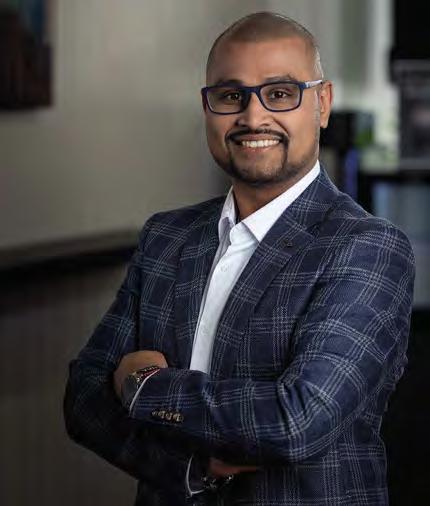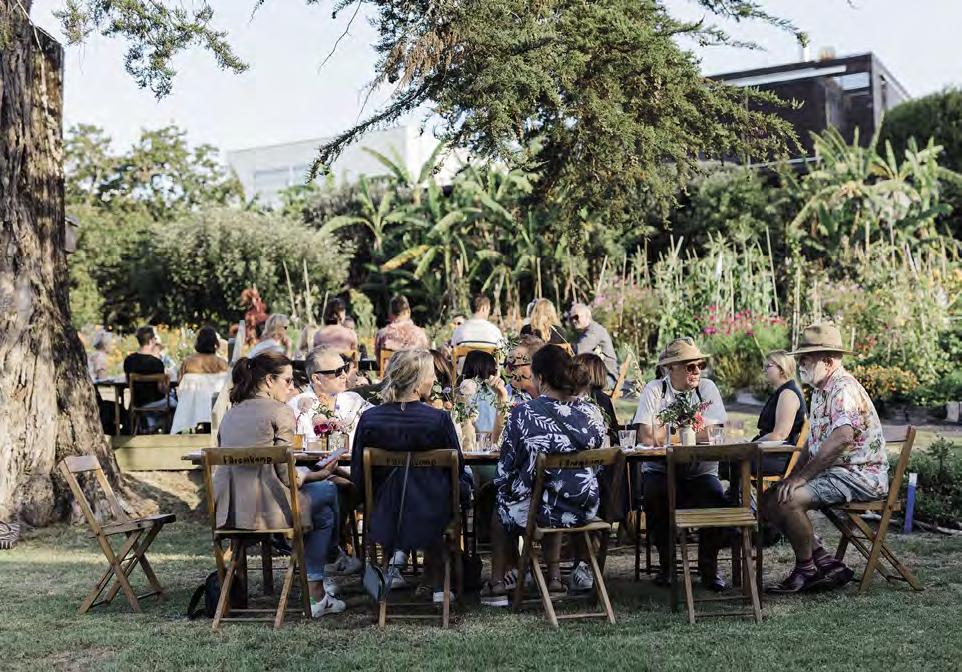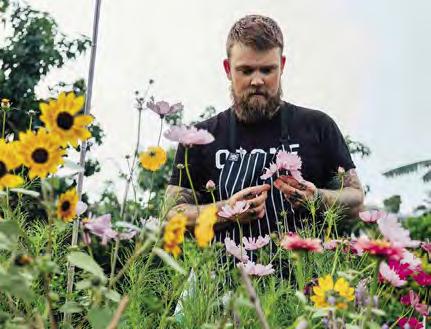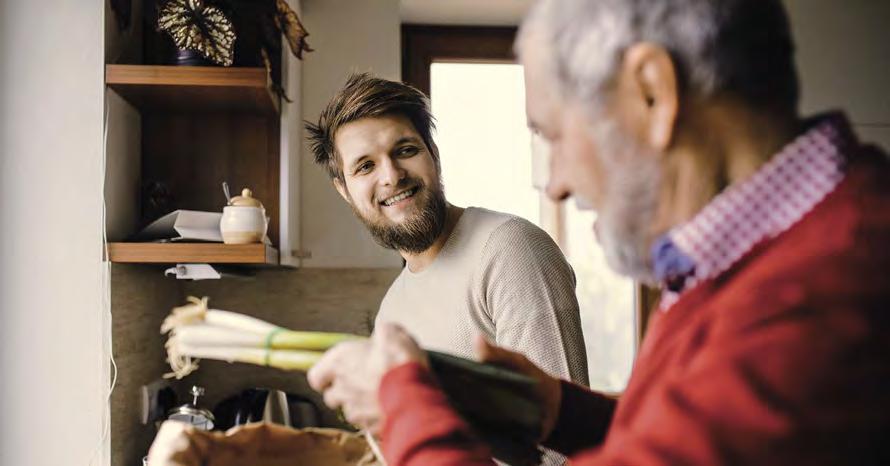
8 minute read
MEET CANNAPLUS
Ponsonby’s New Medicinal Cannabis Clinic Breaking Barriers to Improve our Quality of Life.
CannaPlus+ is New Zealand's first internationally affiliated medicinal cannabis clinic network and telemedicine platform, dedicated to improving both health and lifestyle. The CannaPlus+ clinic is conveniently located in the heart of Ponsonby.
The clinic has been founded with the guiding purpose to improve the lives of New Zealanders by empowering them to live an optimal healthier life by removing barriers and providing access to high quality and affordable medicinal cannabis.
CannaPlus+ is challenging the status quo by educating both health professionals and patients alike about the plethora of uses and health benefits of medicinal cannabis and are dedicated to assisting New Zealanders to get the assistance they need by providing personalised treatment programmes supplied by a team of specialist doctors to ensure patients have access to the best treatment options available.
Central to the CannaPlus+ ethos is the understanding that a holistic view of this emerging industry is critical; achieved not only by empowering their patients but also by taking a leading stance and educating other healthcare practitioners across the country.
Backed by a strong board of medical experts, CannaPlus+ provides Kiwis with safe, research-based, legal and affordable access to high-quality medicinal cannabis treatment.
Behind every successful clinic is a team of expert doctors, that’s why CannaPlus+ had a unique checklist when choosing their physicians to fulfil their mission.
Not only were they looking for leaders in their field, but they also needed to be united by a fervent desire to make a difference in the everyday lives of Kiwis.
“Aside from helping patients manage their symptoms through medicinal cannabis, we needed doctors who were ready to work alongside our patients to empower them on their individual health journeys,” says Chief Medical Officer Dr. Afraz Adam.

CannaPlus+ boasts a carefully selected team of renowned, highly qualified senior consultants with specialties across multiple fields including oncology, palliative care, dermatology, acute and chronic pain, inflammation, gut health, joint issues and muscular pain. They cater to a broad spectrum of patients across a breadth of health concerns.
“When selecting our medical doctors, we focused on finding a diverse team of specialists who were empathetic, understanding, energetic and passionate. All our doctors share these key qualities. They are all both caring and highly professional individuals,” says Dr Adam. “It is important to ensure that patients can not only trust our doctors as medical professionals but also feel safe to speak openly, knowing they are being truly heard,” Dr Adam adds.

CannaPlus+ clinic opens its doors on Tuesday 22 February at 231 Ponsonby Road. For more information please visit their website www.cannaplus.co.nz


KELMARNA GARDENS: Team up with Auckland restaurants for a unique farm-to-table experience at their urban community farm
For the fourth year in a row, Grey Lynn’s Kelmarna Gardens is inviting Aucklanders to join them for an outdoor restaurant experience, enjoying food from the farm, on the farm.
The collaborative Farm Dinners concept was launched in 2019 and has since returned every summer, with local restaurant partners challenged to create a menu inspired by what the garden and the season can provide. This year’s edition sees the return of Symonds Street restaurant, Forest, as well as Grey Lynn favourite Ozone, and the addition of Salo Salo, a new Filipino pop-up tactile dining experience.
This February sees the format expand to a total of six nights, with Forest taking up residence from 16th to 19th February, and Ozone and Salo Salo taking over the following week on 23 and 24 February respectively.
In each case, the fresh, organic vegetables grown all around the diners will form the focus of the set menu, with flavours also drawn from foraged ingredients found in Kelmarna’s food forest, and additional ingredients sourced locally and sustainably.
Forest and Ozone, who both heavily feature Kelmarna’s produce on their menus every week, will each be serving a 4-course set menu, applying their creative lens to use as much as possible from Kelmarna’s 1.7 hectares. Salo Salo, meaning “gathering”, will transport diners to the Filipino archipelago, bringing their take on the traditional communal dining practice of ‘kamayan’, a celebration feast laid out on banana leaves and designed to be enjoyed with the hands.
“We couldn't do what we do without the opportunities provided by our incredible supplier network. Kelmarna are proving the viability of producing nutrient-dense, delicious food in an urban environment at volume,” explains Joe O’Connell, Ozone’s Chef de Cuisine. “We believe it is our responsibility to support what the passionate people at Kelmarna do every day and are thrilled to be able to take part in this series of events.”
Dining out in the garden will help raise valuable funds to support Kelmarna’s educational and therapeutic work in the community, with 50% of proceeds from Farm Dinners going straight to the charitable trust.
Farm Dinners dates: Forest: 16, 17, 18, & 19 February Ozone: 23 February Salo Salo: 24 February
KELMARNA GARDENS, 12 Hukanui Crescent, Ponsonby, T: 09 376 0472, www.kelmarnagardens.nz Tickets for Forest at $95, Ozone and Salo Salo at $90.
For more info and ticket booking visit: www.kelmarnagardens.nz/farmdinners

Towels & more



DAVENPORTS LAW: PLANNING FOR THE NEXT GENERATION
Philip and Barbara had set their trust up when they owned their business, a small engineering firm which had been very successful. They had three adult children and five grandchildren.
The trust owned their family home, a bach in the Bay of Islands, the commercial property that the business was run from and an investment portfolio with a well regarded funds management company.
Philip and Barbara’s eldest son, James, had worked in the business since finishing university and five years ago he had bought the business from Philip and Barbara’s trust. The trust had lent James the money to buy the business. There was no interest being charged and James was slowly paying off the debt over time. Their two other children, Jonathan and Megan, were in vastly different circumstances. Megan was a solo mum, her marriage having split up three years before. She worked as a primary school teacher and Barbara and Philip were often helping her out with both childcare and the odd “little extra” to help her make ends meet. Jonathan was single, a successful real estate agent, who was doing extremely well for himself in the current property market boom.
Barbara and Philip had read a bit about the changes to trust law and of course, it was often the topic of conversation when they met up with their friends. Many of their friends were considering winding up their trusts and Barbara and Philip thought maybe it was something that they should consider. They talked to their accountant who suggested that they meet with a specialist trust lawyer. He said that trust law was becoming far more specialised, and a bit like going to a cardiologist rather than your GP for chest pains, it was wise to seek advice from someone who specialised in trusts.
They got in contact with the lawyer who he had recommended and went along with their large file of trust documents and an open mind. The lawyer explained that there are a lot of people who have trusts who no longer need them – especially as they aged and they wanted to simplify their personal affairs, but there were still very good reasons for lots of people to still have trusts. She said that even though Philip and Barbara no longer had any business risk and that kind of asset protection was no longer required, their family circumstances warranted retaining the trust. Philip and Barbara were very keen for Megan to receive additional funds in the event that they both died and a trust was a great platform to provide that flexibility. Barbara was particularly concerned that if she died and Philip met someone else, that the assets would remain protected for the children. She had seen her own inheritance diminish significantly when her father re-married after her mother passed away. He had ended up giving a lot of his wealth to his new wife’s children during his life time and Barbara would not want that happening to her children. Due to the significance of their assets, the lawyer explained that continuing the trust would be a sensible idea given that concern.
Both Philip and Barbara also wished for the Bay of Islands house to stay in the family for as long as possible and a trust is the perfect vehicle for long term hold of assets. The trust would also assist with making sure that whatever they passed on to their children would be protected for their children and grandchildren and would not become relationship property and then divisible if their relationship split. This was a real concern, especially seeing how vulnerable Megan was after the split from her husband. The lawyer explained that a really good will could also alleviate these concerns, but coupled with their other needs, it was best to keep the trust going.
The trust was also paying school fees for the grandchildren and this offered a tangible tax benefit, as the trust gave the flexibility to be able to tax those income distributions to the grandchildren at their lower tax level.
Barbara and Philip felt hugely relieved after seeing the specialist trust lawyer. She had put them at ease that the structure they had was best and also gave some good advice around how they could improve on how they managed the trust and also make sure the trust was complying with the new changes to the law.
If you feel you could use some specialist trust advice, don’t hesitate to contact the Trusts Team at Davenports Law by calling 09 883 3284 or visiting davenportslaw.co.nz.
Tammy McLeod









